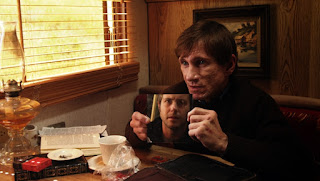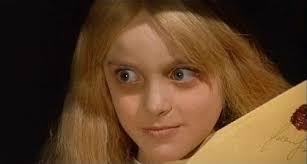 |
| The cast of Raw share a joke on set. |
KAIRO (PULSE) (2001)
An apocalypse of loneliness spreads quietly, bleeding out from dark web ghost rooms, rendering its victims into stains on walls or swirling clouds of ash. Kyoshi Kurosawa was to continue beyond generic bounds to using horror tropes for more philosophical ends. I miss the one of this film and its time; it's effective bleakness (and others like Cure or Seance) put him firmly in his own tribe (they weren't even generically J-horror). His going nice left a gap in Japanese cinema. Once available on local DVD.
DARK WATER (2002)
A mother fighting a messy divorce settlement struggles to normalise her life with her daughter and does ok until a terrifying ghost has other ideas. One of my favourite ghost stories of all time. Do not mistake this for the English language remake. This is a Japanese film. Once available on DVD locally but now, who knows? I've still got my old Hong Kong Region 3 DVD which is outstanding quality but trumped by the Arrow Blu-Ray which came out last year.
UNDER THE SHADOW (2016)
Set in Tehran in the years immediately following the Iranian revolution of 1979. Does to state religion what Dark Water did to gender oppression and, like that masterpiece, doesn't forget to be a horror movie. The shock scene is one of the best I've seen and it's worked for ... hard. Available on Netflix.
RINGU (1998)
Perhaps less obscure than some in this list due to its more famous U.S. remake. The remake adds about twenty minutes of time wasting exposition and clods the ending with a lot of cliched pop video editing and dated-before-it's-finished CGI. Still can't decide? Do you know how you can test the strength of a pop song by singing it with a single instrument and hearing if it still works? Consider that every single effect, including the unnerving finale, of Ringu could have been done in the silent era. Only on DVD anywhere. The local release is ok (assuming you can find a copy) but the best one is the Region 1.
FEBRUARY/THE BLACKCOAT'S DAUGHTER (2015)
The twist in this one is heralded early and obviously. That it courses toward that moment obscures what lies beyond that which is a yearning that should send serious chills. It dispenses with its own generic traits like stages of a Saturn rocket and, like all the best horror, grips a core of petrifying sadness. You'll have to do a little deduction or it really will look like a failed genre piece. On Stan.
THE CABINET OF DR CALIGARI (1919)
Sideshow exhibit, the somnambulist Cesare, is let loose upon a village. Mayhem ensues but are we getting the full story? Can't hack silent movies? Well, not only does this clock out at only an hour and a quarter and was made with a visual style that still wows everyone who sees it (do an image search on the title) it would remind its native Germany of what she went through soon after. So many releases available locally and all pretty good. As this is an ancient silent feature it's almost better to watch it low quality but try and find the best available.
RESOLUTION (2012)
Debut feature of a team who are getting more confident and interesting about their peculiar path through the Lovecraftian shadow world. Here, meagre means are used sparely to allow a big idea to sprout, grow and bloom. You will not see the ending in advance even though it was in front of you for most of the screen time. Hail Benson and Moorehead. If you can't find this you might like the same team's Spring (SBS on Demand).
KILL BABY KILL/OPERAZIONE PAURA (1966)
Mario Bava could make hard left turns from his atmospheric crime thrillers (look up Giallo) and explore some strange places but never more strange than this oddity about a man investigating murder in a small village haunted by a luminous girl on a swing. Atmosphere you could serve as its own soup course and some moments so tastily weird they look like the red room sequences from Twin Peaks decades later. Was available on local DVD in the '00s. Now a region B Blu-ray.
RAW (2016)
A tale of corrupted purity that doesn't just delight in the virtuous vegan heroine becoming ravenously carnivorous but plunges into uncharted waters and keeps its nastiest trick to the final shot. Intense and compelling it clocks in at under ninety minutes and wastes nary a one. While never really explicitly gorey there are scenes that this ol' horror fan could only stare at. The eye popping is happening in front of the screen, here, not on it. Chuck this into a mainstream mix and see if anyone wants to giggle. Currently available on demand at SBS.
AMER (2009)
A very strange piece which begins as a kind of cover band for European horror or giallo but plays its own game as a girl grows from a childhood in a Suspiria like mansion, through some Jess Franco style interplay to an all out Fulci slice and dice finish. Near plotless but utterly compelling. Place it after a something popular and worn (but fun). Can be talked over but that won't last too long if anyone's paying any attention at all. Brief but bursting. On Stan.
ONIBABA (1964)
Always a little iffy including this in horror lists as it's much more of a folk tale with grim elements. However, the central story of predation and morbid jealousy in the low visibility world of the riverside rushes gives it an irresistible atmosphere. One of my favourite films ever. Not released locally. Find if you can.
MARTYRS (2008)
Different phases with their own styles make this one a tough recommendation but all of the shifts are warranted as we find out more and more of the central situation. Curiously, as the on screen violence decreases in the second half the sense of something far more horrible at work grows. The control is the fearsome thing and the very end is a gut punch. Mark Kermode called this film "a very rough ride". He wasn't kidding. Be warned. Local DVD and Blu-Ray.
LAKE MUNGO (2008)
Like a feature length Australian Story but with its initial chills questioned only to reveal worse things beneath them. The interviews feel natural (they were lightly controlled ad libs) and a great deal of creativity went into the stock of evidence presented. The eeriness builds as we feel we know less and less about the story the more we are presented with. A great Australian film. Local DVD and some streaming services (do a search)
COLIN (2008)
Colin is a zombie like all the other ones shuffling along the streets of London. His family want him back, back at home but also back the way he was. Well, they do their best. The rainy day video realism is the trump card here as we get a sense of what it really might look like if we started degrading into shuffling consumers of brains. Oh wait.... Loach does Romero and it works. Local DVD release but can't vouch for the availability.
THE BABADOOK (2014)
From survivor guilt to the sleep deprived world of the single parent with a child who worries other children and a book that turns from romper room gothic to living nightmare, The Babadook runs a gamut. Essie Davies carries centuries of care wear on her shoulders as her lines of communication with her son erode. Restlessly creative and durable. Don't go by the point-missing trailer, just watch the movie. Streaming on Netflix.
















